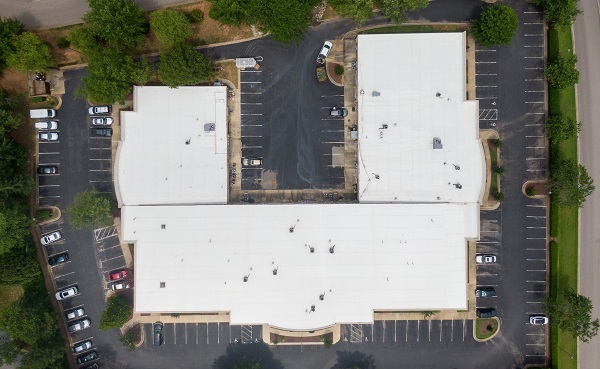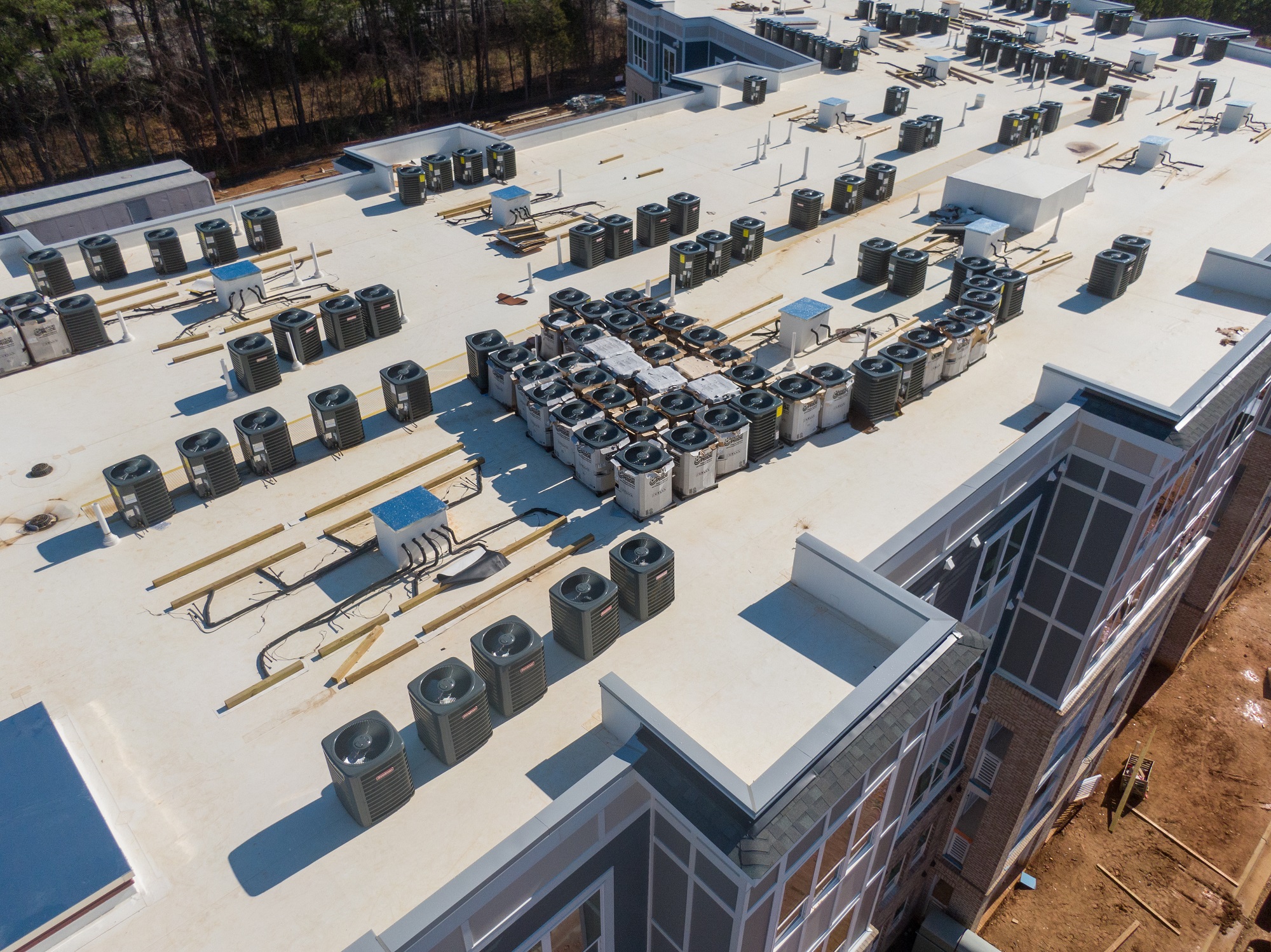Evaluating Durability and Performance: A Comprehensive Comparison of TPO and PVC Roofing Solutions
When it comes to puncture resistance, TPO clearly outperforms PVC in roofing applications. TPO’s robust formulation and customizable thickness options enhance its durability against punctures. Its heat-welded seams further improve its ability to withstand damage compared to PVC. While both materials are viable, TPO provides superior long-term performance under various environmental conditions. Therefore, if your primary concern is puncture resistance, TPO’s advantages make it the better choice. To fully understand the characteristics and uses of each membrane, you’ll want to explore further insights on their unique benefits.
Overview of TPO and PVC

When comparing roofing membranes, it’s essential to understand the differences between TPO and PVC.
TPO, or Thermoplastic Polyolefin, is a heat-weldable membrane made from a blend of polypropylene and ethylene propylene rubber. It’s available in thicknesses from 45 mil to over 80 mil and reflects nearly 87% of UV rays, promoting energy efficiency.
Conversely, PVC, or Polyvinyl Chloride, is known for its durability and chemical resistance, typically ranging from 50 mil to 80 mil in thickness.
While both membranes can be installed using various methods, TPO employs heat-welded seams for enhanced leak prevention.
PVC is often favored for its fire resistance and long-term performance in harsh conditions, making both options viable depending on your specific requirements.
Read more about TPO Roofing Systems Here
Get StartedPuncture Resistance Comparison
Understanding the puncture resistance of roofing membranes can significantly influence your choice between TPO and PVC. TPO membranes excel in puncture resistance due to their robust design and heat-welded seams, offering superior performance, especially in challenging environments.
Here are key factors to consider:
- Independent Testing: TPO consistently outperforms PVC in standardized puncture resistance tests, particularly against sharp debris.
- Thickness Options: TPO membranes range from 45 mil to 80+ mil, enabling customization for high-risk areas, while PVC typically offers standard thicknesses.
- Formulation Resilience: TPO’s formulation provides better long-term resistance against environmental pollutants, enhancing its puncture durability over time.
Ultimately, TPO’s advantages make it a strong contender for puncture resistance in roofing applications.
Installation Methods and Considerations
Three primary installation methods exist for TPO roofing: mechanically attached, fully adhered, and ballasted. Each method offers flexibility to suit your building’s requirements and budget. Mechanically attached systems secure the membrane with fasteners, while fully adhered methods use adhesive for a seamless finish. Ballasted installations rely on weight, typically gravel or pavers, to hold down the membrane.
TPO membranes, available in large sheets up to 12 feet wide, can expedite installation and reduce business disruption. Additionally, TPO’s impressive reflectivity—up to 87% of UV rays—can help lower cooling costs.
To ensure optimal performance, it’s essential to choose a certified installer. Proper installation by professionals ensures compliance with manufacturer specifications, maximizing the roofing system’s durability and effectiveness.
Longevity and Maintenance Factors
Longevity in roofing materials is crucial for ensuring long-term performance and cost-effectiveness. TPO membranes typically come with a warranty of up to 20 years, showcasing their reliability.
Designed to withstand environmental pollutants and chemicals, TPO requires less maintenance, which enhances its lifespan. With thickness options from 45 mil to over 80 mil, TPO offers a robust barrier against punctures and other damage.
Additionally, TPO’s energy efficiency, reflecting nearly 87% of UV rays, reduces cooling costs and minimizes wear on the material. Implementing regular maintenance programs, such as North American Roofing’s StarCare™, can significantly prolong TPO roof life by addressing issues proactively, ensuring your investment remains protected for years to come.
Do You Need TPO Roofing Service?
Give us a call today to discuss PVS or TPO roofing options and discover how we can elevate your commercial roofing experience.
Warranty Duration Differences
Understanding the warranty duration differences between TPO and PVC roofing membranes can significantly impact your decision-making process.
TPO membranes typically offer warranties ranging from 15 to 20 years, which reflect their reliability in various conditions.
In contrast, PVC roofing membranes often provide longer warranties, extending up to 30 years, thanks to their enhanced durability and resistance to environmental factors.
It’s essential to note that the warranty duration for TPO can depend on installation methods and maintenance practices, while PVC warranties may cover specific environmental conditions.
Both options come with support from major manufacturers, ensuring quality.
While TPO presents a more budget-friendly upfront cost, PVC’s longer warranty and durability might justify its higher initial investment in the long run.
Long-term Value Analysis
Assessing long-term value requires a thorough examination of both cost and warranty insights for TPO and PVC roofing membranes.
Both options excel in puncture resistance, but you should consider these key factors:
- Warranty Duration: PVC membranes offer warranties up to 30 years, while TPO typically covers 15 to 20 years, indicating a strong reliability for PVC.
- Cost Efficiency: TPO systems generally cost less, making them budget-friendly upfront, which can appeal to cost-sensitive businesses.
- Energy Savings: TPO reflects 87% of UV rays, potentially lowering cooling costs and enhancing long-term savings.
While TPO’s heat-welded seams enhance leak prevention, PVC may provide extended warranty coverage, giving both options unique long-term value benefits.
Read more about the different roofing systems we can install.
Learn what to expect when we show up for your commercial roofing project.
Choosing the Right Membrane
When it comes to selecting the right roofing membrane, weighing the benefits of TPO and PVC is crucial to your project’s success.
TPO membranes excel in puncture resistance due to their heat-welded seams, making them ideal for storm-prone areas. Their abrasion and tear resistance enhance durability against environmental pollutants and physical wear.
While PVC membranes offer greater flexibility, TPO’s large sheets (up to 12 feet wide) simplify installation and minimize seam vulnerabilities.
Both options boast Energy Star ratings, but TPO reflects nearly 87% of UV rays, which can lower cooling costs and extend the roof’s lifespan.
Ultimately, assess your specific project needs, as TPO often proves more cost-effective while still delivering outstanding durability and performance.
Get TPO or PVC Roofing with North American Roofing
When it comes to roofing solutions for commercial properties, North American Roofing stands at the forefront as the leading contractor in the United States. With over 43 years of experience in the roofing industry, our team is dedicated to providing exceptional workmanship and customer service. Specializing in industrial and commercial roofing, we offer a range of high-quality services including installation, repair, and replacement of various roofing materials. We understand the importance of a reliable roof for your business, which is why we also provide our StarCare™ maintenance plan. This plan ensures that our clients receive 24/7 coverage and prompt response times for emergency repairs, giving business owners peace of mind.
One of the standout options we offer at North American Roofing is TPO (Thermoplastic Olefin) roofing systems. TPO is quickly becoming the go-to choice in commercial membrane roofing due to its flexibility, versatility, and high performance. Engineered for long-term durability, TPO is an environmentally friendly solution that provides excellent reflectivity, making it ideal for cool roofing applications. This can lead to significant energy savings for warehouses, storage facilities, and other commercial environments. Moreover, TPO is designed to withstand harsh conditions, offering resistance to environmental pollutants, chemicals, and physical damage such as tears and punctures.
Choosing TPO roofing not only enhances the performance of your commercial property but also contributes to sustainability efforts, as it qualifies for LEED credits and is Energy Star rated. At North American Roofing, we are committed to helping our clients find the best roofing solutions tailored to their specific needs. Whether you’re facing roof leaks or looking for preventive maintenance, our highly trained contractors are ready to assist you.
Do You Need TPO Roofing Service?
Give us a call today to discuss PVS or TPO roofing options and discover how we can elevate your commercial roofing experience.

